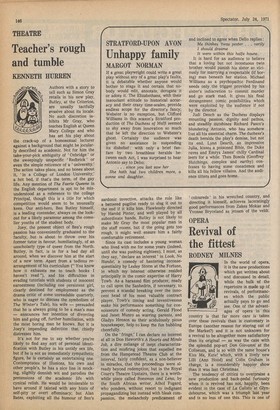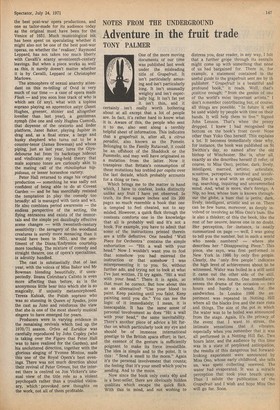Revival of the fittest
RODNEY MILNES
In the world of opera, it is the new productions which get written about and discussed in detail, while the bulk of the repertoire is mode up of revivals, of performances which the public actually pays to go and see. One of the advantages of opera in this country is that far more care is taken over these revivals than is customary in Europe (another reason for staying out of the Market?) and it is not unknown for a revival to be altogether more satisfactory than its original — as was the case with the splendid pop-art Don Giovanni at the Coliseum, and is so with the same house's Kiss Me, Kate! which, with a lively new Lilli (Ann Hood) and Colin Graham in charge, is a considerably happier show than it was last Christmas.
The tendency of critics to overpraise a new production and back-pedal furiously when it is revived has not, happily, been evident in the case of La Calisto at Glyndebourne, which was a triumph last year and is no less of one this. This is one of the best post-war opera productions, and one as tailor-made for its audience today as the original must have been for the Venice of 1651. Much musicological ink has been spent on speculating whether it might also not be one of the best post-war operas, on whether the realiser,' Raymond Leppard, has not taken too much liberty with Cavern's scanty seventeenth-century leavings. But when a piece works as well as this, it surely doesn't matter whether it is by Cavalli, Leppard or Christopher Marlowe.
The atmosphere of sexual anarchy attendant on this re-telling of Ovid is very much of our time — a case of opera made Flesh — and you soon lose track of who is which sex (if any), what with a topless soprano playing an apprentice satyr (Janet Hughes, greener, shinier and altogether lovelier than last year), a gentleman nymph (the one and only Hughes Cuenod), that doyenne of the oratorio and 'leder platform, Janet Baker, playing Jupiter in drag and, as a final straw, a large and husky shepherd who turns out to be a counter-tenor (James Bowman) and whose piping, just as last year, lures the Glyndebourne bat from its backstage hideout and vindicates my long-held theory that male soprano tones are curiously akin to the mating call of the rhinolophus hippidosus, or lesser horseshoe variety.
Peter Hall returned to stage his original production — something he was sadly not confident of being able to do at Covent Garden — and he has mercifully resisted the temptation to play the comedy too broadly: all is managed with taste and wit.
He also combines period awareness — the endless perspective of the setting, the flying entrances and exists of the immor tals and the simple yet dazzlingly effective scene changes — with twentieth-century sensitivity: the savagery of the woodland creatures is surely more menacing than it would have been in 1651, and the sen timent of the Diana/Endymion courtship more touching. The mixture of comedy and straight theatre, one of opera's specialities, is adroitly handled.
The cast is substantially that of last year, with the voices of Miss Baker and Mr Bowman blending beautifully, if unex pectedly. Ileana Cotrubas's Calisto is even more affecting than before, as is the anonymous little bear into which she is so magically, if unjustly metamorphosed. Teresa Kubiak, the Polish soprano who was so stunning in Queen of Spades, joins the cast as Juno and reinforces the view that she is one of the most sheerly musical singers to have emerged for years.
Producers were in varying evidence in the remaining revivals which tied up the 1970/71 season. Orfeo ed Euridice was carefully reproduced by John Copley (who is taking over the Figaro that Peter Hall was to have realised for the Garden), and his uncluttered direction, together with the glorious singing of Yvonne Minton, made this one of the Royal Opera's best even ings. There was not much direction about their revival of Peter Grimes, but the inter est there is centred on Jon Vickers's unusual view of the title role as a violent psychopath rather than a troubled visionary, which provoked new thoughts on the work, not all of them profitable.











































 Previous page
Previous page